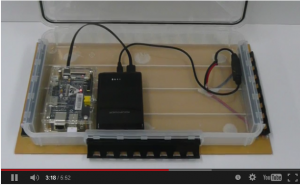 Dirt-cheap cell phones are showing up even in remote jungles. But what to read? And wouldn’t it be nice if you could even watch instructional videos?
Dirt-cheap cell phones are showing up even in remote jungles. But what to read? And wouldn’t it be nice if you could even watch instructional videos?
Enter Solar-Powered Educational Learning Libraries, aka SPELLs. This BBC video explains the basic idea, developed by Prof. Laura Hosman at California Polytechnic State University.
Take a Banana Pi computer, similar to a Raspberry Pi, and add the software to turn it into a server. Bring in WiFi so those phones can pick up goodies from the computer. Hook the Banana Pi up to a rechargeable battery. Enclose everything in a transparent waterproof plastic box attached to the back of a 10-watt solar panel. Stock the server with appropriate texts and videos. Take special care to include locally relevant content, such as this MP4 video educating Micronesia about common mistakes of small business people (screenshot below). Fifty primary schools in villages in the Pacific Islands will benefit.
 I love the idea and suspect that more attention has been paid to teacher preparation than is often true with tech-related projects for schools and communities in developing countries. One positive is the existence of a Content Website with PDFs of, among other things, a guide to the International Children’s Digital Library (available to some extent on the servers, I’d hope).
I love the idea and suspect that more attention has been paid to teacher preparation than is often true with tech-related projects for schools and communities in developing countries. One positive is the existence of a Content Website with PDFs of, among other things, a guide to the International Children’s Digital Library (available to some extent on the servers, I’d hope).
A caveat is that the kids and parents will be limited by the amount of material locally if they lack access to a genuine Net connection, not just an isolated hotspot. By contrast, a project such as Outernet enables access to Project Gutenberg books and other content piped in via satellite (here’s information on Outernet hardware), even if Outnet comes with its own limitations.
In the end I can see positives in both approaches as narrowers of the digital and educational divides. A strong argument can be made for localization of the kind that SolarSpell—the group behind SPELLS—values. What’s more, without dependence on slow Outernet-style connections, amenities such as video are possible.
































My website http://www.warmspot.net explains how (and why) to set up a very similar system, using the Raspberry Pi and broadcasting web pages, web apps and E-book files.
@Buzz: Hi, Bennett. So glad to see your link in there. Would you consider adding waterproofing and solar options to your vision? Perhaps the solar and waterproofing could piggyback on what the folks in California are doing.
David
With 128 gig usb sticks going for $30, load a stick full of Project Gutenberg books and other non-copyrighted material and plug it to the Pi. Maybe roving librarians could go from village to village swapping usb sticks with new (to that village) material. Some of the international news agencies might be persuaded to donate sticks pre-loaded with news articles to circulate to these remote locations. Clinicians making their rounds to the villages could bring in the pre-loaded sticks. Not as fast as satellite, but still better than the grapevine. All sorts of other uses come to mind – manuals on first aid and agricultural practices, recordings of cultural events, etc.